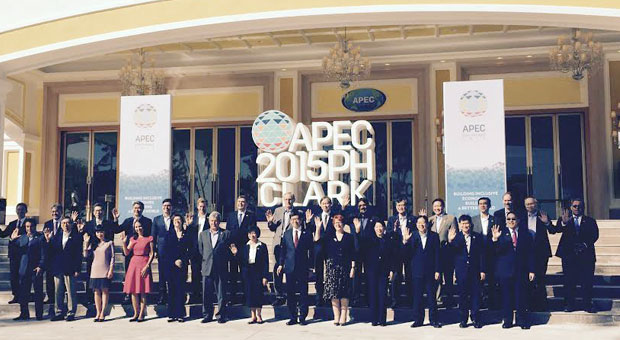From Nov. 16 to 19, 2015, the Philippines is host to the 27th Asia-Pacific Economic Cooperation (Apec) summit, which will be attended by leaders of its 21 member-economies.
Held this year in Manila, the annual Apec Economic Leaders’ Meeting serves as a bridge for the 21 member-economies separated by the 165.25 million square kilometer expanse of the Pacific.
Inquirer special coverage: Asia-Pacific Economic Cooperation Summit
The 21 member-economies of Apec, linked by their proximity to the Pacific Ocean, range from global giants such as the United States of America, China and Russia, to developing nations such as Papua New Guinea and Philippines.
Amid the business and economic jargon, INQUIRER.net boils down to seven items the essential facts about Apec’s members and where the Philippines stands in the region.
Here are the #InquirerSeven essential facts you need to know about the 21 Apec member-economies.
1. US and China account for over 60 percent of the total GDP of Apec economies.
According to the 2014 data of the World Bank, the size of the US economy is at $17.4 trillion while China’s is at $10 trillion. They make up 63 percent of the gross domestic product (GDP) of the Apec community, more than all other 19 members combined.
The World Bank defines GDP as “the sum of gross value added by all resident producers in the economy plus any product taxes and minus any subsidies not included in the value of the products.”
Japan, Russia, and Canada are the third, fourth, and fifth biggest economies in Apec. The Philippines’ $284-billion economy ranks 15th, just behind Hong Kong (14th at $289 billion) and ahead of Chile (16th at $258 billion).
2. China has the fastest growing economy among Apec members.
While the United States currently has the largest economy, China is outpacing it in terms of economic growth. China’s GDP growth as of 2014 was 7.4 percent while the US economy grew by only 2.4 percent.
The Philippines is the fastest growing economy in Southeast Asia at 6.2 percent. Other Southeast Asian countries such as Malaysia, Papua New Guinea, Vietnam, Brunei and Indonesia are each growing at around 5 percent.
3. China’s population is equivalent to nearly half of all Apec countries combined.
China’s 1.3-billion population is the biggest among Apec member-economies, accounting for 48 percent of the combined total of all members.
The World Bank counts “all residents regardless of legal status or citizenship–except for refugees not permanently settled in the country of asylum, who are generally considered part of the population of their country of origin.” Figures are mid-2014 estimates, it said.
The United States has the second largest population at 318 million while Indonesia follows suit at 254 million. The Philippines’ estimated population of 100 million ranks seventh between Mexico (125 million) and Vietnam (90 million). In terms of population growth, Papua New Guinea has the highest growth rate at 2.1 percent, followed by Philippines at 1.6 percent. China is growing at a relatively slow rate at 0.5 percent.
Populations of developed countries like the United States, Russia and South Korea are growing at a rate of less than 1 percent, while Japan is the only member-economy with a negative population growth rate, meaning more people are dying than being born.
4. Brunei has the highest unemployment rate among Apec members.
According to December 2014 figures from economics data website TradingEconomics.com, Brunei had the highest unemployment rate among members economies of Apec at 6.9 percent. Canada, Peru, Australia, Chile and the Philippines all had unemployment rates of 6 percent and above.
Papua New Guinea, Vietnam and Singapore were among the economies with the lowest unemployment rates at around 2 percent. Thailand had the lowest unemployment rate at 0.5 percent.
5. Almost all of Japan’s citizens are Internet users.
More than 90 percent of Japan’s population is connected to the Internet as of 2014, according to data from the World Bank. The World Bank defines “Internet users” as “individuals who have used the Internet (from any location) in the last 12 months. Internet can be used via a computer, mobile phone, personal digital assistant, games machine, digital TV, etc.”
The Apec member-economies with the lowest percentage of internet users are Indonesia (17.1 percent) and Papua New Guinea (9.4 percent).
6. The United States had the highest number of tourist arrivals in 2013.
With 69.7 million arrivals, the United States recorded the highest number of tourist arrivals among Apec members, according to the 2013 data of the World Bank.
The World Bank counts the “number of tourists who travel to a country other than that in which they have their usual residence, but outside their usual environment, for a period not exceeding 12 months.” It also said that “a person who makes several trips to a country during a given period is counted each time as a new arrival.”
China and Russia ranked second and third in tourist arrivals, while the countries with the lowest tourist arrivals are Brunei and Papua New Guinea. Philippines ranked 15th at 4.6 million tourist arrivals, behind Australia (14th at 6.3 million) and ahead of Chinese Taipei (16th at 4 million).
7. Where do Apec members stand in other global rankings?
Almost all Apec member-economies have been ranked in studies released by international organizations. Below are rankings for the Global Competitiveness Index (GCI) by World Economic Forum, Corruption Perceptions Index (CPI) by Transparency International, Global Peace Index (GPI) by Institute for Economics and Peace, and Human Development Index (HDI) by the United Nations Development Program.
RELATED STORIES:
PUBLIC LIVES: Reflections on Apec
Cebu brings out its best for Apec 2015
Apec should not inconvenience Filipinos–Fidel Ramos
